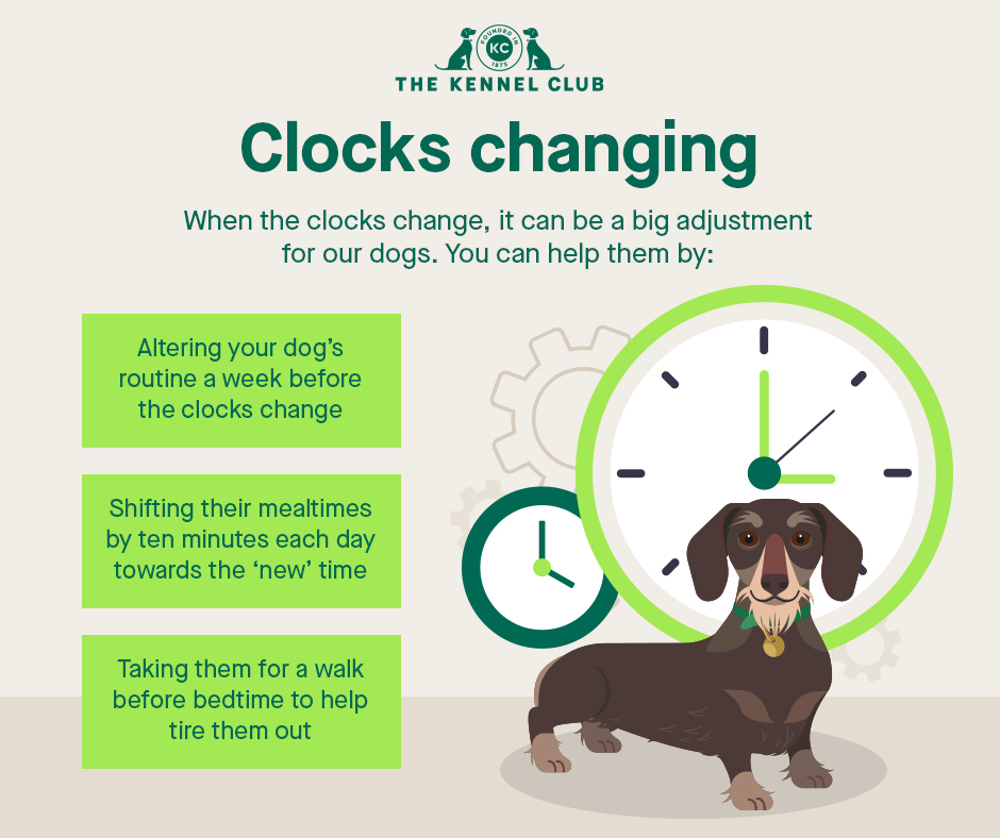
In the UK the clocks go forward one hour at 1am on the last Sunday in March, and back one hour at 2am on the last Sunday in October. The change in timings can be confusing for us, but an even bigger change for our pets. When the clocks change, adapting to a new time can be confusing for us, but for our pets it can be completely baffling.
Clocks changing
Clocks going forwards routine
Although many of us quickly get used to this change, it can be harder for our pets to adjust. But you can help your pet if you are organised and prepare them a little bit each day in the lead up to the clocks going forward. Don’t try and force your dog to wake up an hour earlier, as this could be stressful to them. Make this a gradual change by adjusting their breakfast time over a week-long period by 10 earlier mins each day. This way will encourage them to wake up earlier knowing that they will receive their breakfast and naturally adjust their morning routine.
If your pet has a specific bedtime, then follow the same steps as above, but make their dinner time 10 minutes earlier each day. This may be tricky as many pets don’t go to sleep straight after their dinner, but there are things that you can do to encourage your pet to sleep earlier. Again, try to put them to bed 10 mins earlier each night for a week. You can also try taking them on a nice walk before bedtime to help tire them out.
Clocks going back routine
You can help your pet by getting them ready a little bit each day in the lead up to the clocks going back. Don’t try and force your dog to wake up an hour later, as this could be stressful to them. Make small adjustments every day, such as changing their breakfast time over a week-long period by 10 mins later each day. This will encourage them to wake up later knowing that they will receive their breakfast and naturally adjust their morning routine.
If your pet has a specific bedtime, then follow the same steps as above, but make their dinner time 10 minutes later each day. This may be tricky as many pets don’t go to sleep straight after their dinner, but there are things that you can do to encourage your pet to sleep later. Again, try to put them to bed 10 mins later each night for a week. You can also try taking them on a nice walk earlier in the day rather than before bedtime.
How do the clocks changing affect my dog?
Dogs and cats are creatures of habit whose lives usually depend on having some type of routine. Often if our daily routines are disrupted, then so are our pets, which can trigger mild stress. Adjusting their schedule gradually will help to create as little stress as possible for them.
Separation anxiety
Once the clocks go forward and the nights get lighter, humans are more likely to spend more time outside, as well as being out for longer periods of time. This can mean that if your dog is being left alone for longer periods of time each day they can develop separation anxiety. This can be hugely stressful for some pets, particularly dogs, and can lead to changes in their behaviour and mood. Commons signs are howling, defecating and repeated escape bids.
More time outside (clocks go forward)
Often, the influx in more daylight can create a new lease of life in dogs. This can make many dogs want to go outside more. As nice as this is to witness, be mindful of the dangers that come with your dog being outside more often. Dangers can include adder bites, wasp and bee stings, slug and snail pellets and heat stroke.
Hotter weather (clocks go forward)
Clocks going forward means we are beginning to see better weather as we step into spring. Some months have seen record soring heat waves. It is important to keep our dogs as cool as possible during this time. There are many ways to do this, please see our ‘how to keep my dog cool in the summer’ page.
Top tips for helping your dog with the clocks changing
- Adjust your pet’s feeding and medication schedule
- Re-schedule their feeding times by 10 mins each day
- Take them on a nice walk before bedtime
- Change their toilet break times
